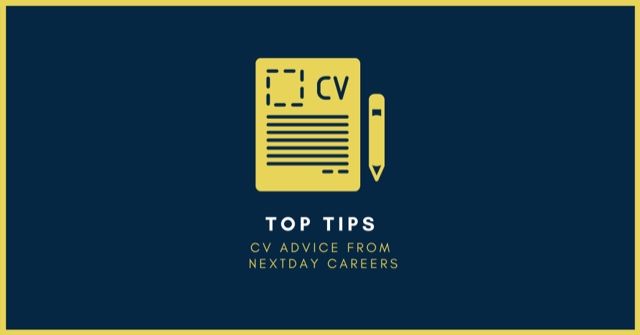CV Advice From NextDay Careers

Top Tips – CV Advice
1.CV presentation matters
First things first: when applying for a new role, you only have a limited window of opportunity in which to catch your prospective employer’s attention. You have to convey the key information you want to get across in a succinct and eye-catching manner. Make good use of bullet points, but don’t overuse them – having too many with excessive text is likely to defeat the object of conveying information concisely.
When we send your CV to a client, we have to ensure that your CV doesn’t overburden the reader with too much information. If you can keep your CV to two sides then it’s a good idea to do so; this gets harder the longer you’ve been in work, of course, but ensuring the most relevant information is available only is key.
2. Demonstrate your flexibility in your CV
One thing employers are looking for from applicants is an indication that they’re open to continually learning and branching out into new areas. After all, modern-day jobs are founded on flexibility, and employees are required to take on new responsibilities all the time. Job descriptions are still useful as a general guide, but they can’t capture the full complexity of the modern working environment. When you write a CV, therefore, you must demonstrate that you’re prepared to be flexible as well.
During the current pandemic, we’ve all had to make pretty drastic changes to the way we work simply to keep things going as best we can. Flexibility is very much the current watchword. If you can demonstrate to an employer that you’re particularly well placed to adapt according to the changing needs of the new, post-covid working environment, it could just give you the edge over less nimble and adaptable applicants.
3. Tailor your CV according to the job description
We’ve already noted that job descriptions offer only a partial snapshot of what you’d be expected to do once in the role. However, they offer some valuable hints as to what your employer is looking for. If you’re looking to glean an advantage in your efforts to secure a particular job, then, you should write a CV that matches the description more closely. It’s always worth reading job descriptions carefully to gain crucial insight into what the employer is looking for.
4. Prove that you’ve kept yourself busy
If there’s one thing that makes employers wary, it’s finding gaps in an applicant’s CV. Now, it goes without saying that there are lots of good reasons for extended gaps between jobs. It might be that you simply decided to take a sabbatical and weigh up your options, or you tried something that didn’t work out, or perhaps you’ve just been generally a bit unlucky. That’s fine. But you will need to prove to a prospective employer that you haven’t spent the time simply sitting around waiting for something to fall into your lap.
Employers will look for evidence that you’ve been proactive and that you’ve sought to use your time out of work productively. Write a CV in a way which proves it. Perhaps you’ve done some freelance work as a stop-gap, or you’ve embarked on a course to learn new skills. This will reassure your employers that you have a solid work ethic, and it’ll put you in a better position.
5. Sharpen your CV summary
When you come to write a CV, it’s always useful to include a quick summary at the start introducing yourself, outlining your skills and listing some of your interests outside of work. Make sure your summary is concise and, again, relevant to what employers are actually looking for. As we’ve discussed, prospective employers are likely to find themselves bombarded with CVs and they’ll be scanning them for key, relevant information. Including a summary is a good way of emphasising your suitability for the job and the strength of your previous experience – so use that space well.
If you would like to find out more or perhaps you’re after a bit of guidance as to how you could sharpen up you’re CV to make it more appealing to prospective employers then get in touch with Next Day Careers.
